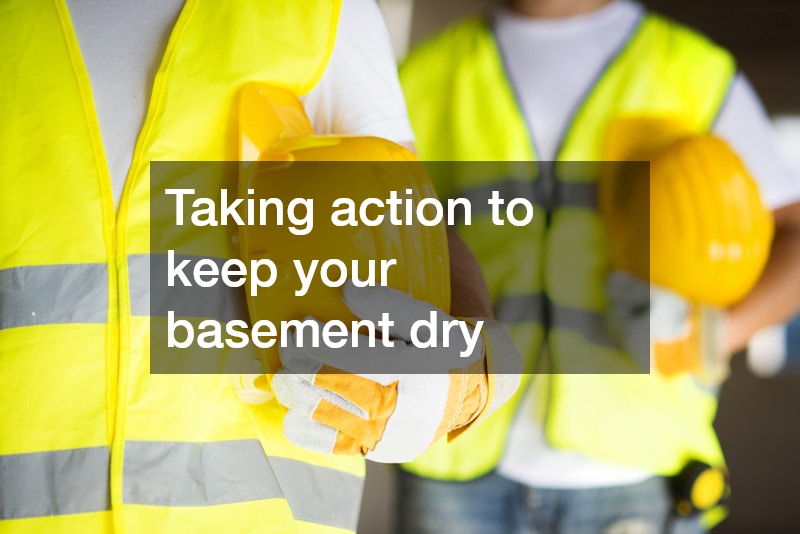
Local basement contractors are the best ally when it comes to keeping your basement dry. Basement problems like water seepage, damp areas, and all-out flooding are common problems, but they are not problems you should ignore. While basement issues are common, ignoring them can lead to bigger problems.
Many homeowners ask the same questions when it comes to their basements. For example, how do you dehumidify a basement or why do basements leak? Turning to an expert with extensive experience can get all your questions answered. Basement problems are common, but the cause of the problem is unique to the property. There is no one-size-fits-all approach to basement waterproofing. Expert support can identify your specific problem and create a plan to repair the issue.

Whether you are dealing with basement seepage or are concerned about periodic flooding, a basement contractor can help. A wet damp basement is not only wasted space, but it is a threat to the safety of your home. A damp basement can lead to mold problems and more. Taking action to keep your basement dry and usable is one of the best ways to keep your home safe.

If can be difficult to keep a basement dry. They are underground where sun usually has a hard time getting in. Basements seem to want to be wet from basement water leaks to storms to humidity. Even though it’s a challenge, a wet basement can be bad news. It can damage anything that is not stored properly or is left unsealed. You will want to do everything you can in order to keep your basement from getting damp in order to be able to still store things down there. Water damage made up 26.4 percent of insurance claims involving loss in the United States alone within one year. A lot of those had to be basements because if a home has a basement, there is more than 98% chance that the homeowners will experience some sort of water damage in their time living there. Basements cracks and leaks are a common problem and repairing foundation leaks, or any kind of foundation repairs can be a big, expensive job. Here are a few tips to avoiding a wet basement all together:
-
- Clean the Gutters
Keeping the gutters clean will avoid water getting stuck in them and damaging the gutters causing leaks and water to get through. You will also want to make sure that the downspouts are positioning so that they direct water away from the foundation of your home.
- Clean the Gutters
-
- Cover the Ground
If you happen to have only a partial basement, these typically have adjoining crawlspaces that have exposed dirt. Make sure you cover the ground by using a six mil thick polyethylene sheet. The plastic should overlap about six inches so that the excess can spread to the walls. Bricks are great to keep the sheeting in place. The reason you should do this is because a crawlspace made of dirt or earth can attract humidity and trap it in the basement causing mildew to grow and thus the musty basement smell. No one likes to smell that, so if you are starting to get hints of it, look for earthen crawlspaces you may have missed.
- Cover the Ground
-
- Install Exhaust Fans
This will help you out a lot. Most bathrooms and kitchens already have these but putting some in your basement can have the same effect of dehumidifying the room. You will have to find out what size or how many exhaust fans you will need in order to avoid having a wet basement. They will probably be quite a bit bigger and possibly more pricey than a simple bathroom exhaust fan and you will want a professional to come out and install the fan for you to ensure it functions efficiently. Never attempt something like this by yourself, as it usually turns into a disaster that you end up having to pay extra to fix. Let the experts do their job.
- Install Exhaust Fans
- Install a Sump Pump
Installing a sump pump is a good idea only if you have a connection to the drainage system. The water that the sump pump collects will need somewhere to be dumped on regular occasions. In order to really be affected, the sump pump should be fitted with a battery operated back up system in case of a black out during storms or bad weather. This is another job that should be left to the professionals instead of attempted alone.
Other water proofing solutions are available to avoid the whole wet basement problem and you should definitely look into them and incorporate them into your home. You really probably save money in the long run. Even if you have to shell out initially, the fact that you won’t have to pay for wet basement repairs or things that happen because the basement got wet will even themselves out over time. Keep your basement dry and you will save a lot of time and money. Letting it go to long and then ending up with moisture in your basement because your procrastinated is one of the worst feelings. And the truth is, if 98 percent of homeowners experience wet basement troubles at some point or another, it’s only a matter of time before your card is pulled unless you act now and do something about protecting your basement from any kind of moisture.
